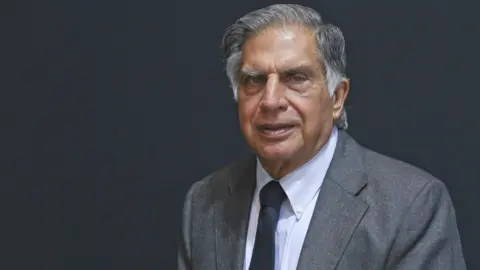 Getty Images
Getty Images
Indian tycoon Ratan Tata has died aged 86, says the Tata Group, the conglomerate he led for more than two decades.
Tata was one of India's most internationally recognised business leaders.
The Tata Group is one of India's largest companies, with annual revenues in excess of $100bn (£76.5bn).
In a statement announcing Tata's death, the current chairman of Tata Sons described him as a "truly uncommon leader".
Natarajan Chandrasekaran added: "On behalf of the entire Tata family, I extend our deepest condolences to his loved ones.
"His legacy will continue to inspire us as we strive to uphold the principles he so passionately championed."
During his tenure as chairman of the Tata Group, the conglomerate made several high-profile acquisitions, including the takeover of Anglo-Dutch steelmaker Corus, UK-based car brands Jaguar and Land Rover, and Tetley, the world's second-largest tea company.
UK Business Secretary Jonathan Reynolds said in tribute that Tata was a "titan of the business world" who "played a huge role in shaping British industry".
A profile published in the Economist magazine in 2011 called Tata a "titan", crediting him with transforming the family group into "a global powerhouse".
"He owns less than 1% of the group that bears his family name. But he is a titan nonetheless: the most powerful businessman in India and one of the most influential in the world," the magazine said.
In 2012, he retired as chairman of the group and was appointed chairman emeritus of Tata Sons, the group's holding company.
Indian Prime Minister Narendra Modi hailed Tata as a "visionary business leader, a compassionate soul and an extraordinary human being".
Paying tribute on X, formerly known as Twitter, Modi recounted "countless interactions" with Tata and said he was "extremely pained" by his death.
Tata - whose body is lying at a cultural centre in Mumbai to allow people to pay their respects - is to receive a state funeral later on Thursday.
Tata was born in a traditional Parsi family in 1937. He studied architecture and structural engineering at Cornell University in the US.
In 1962, he joined Tata Industries - the promoter company of the group - as an assistant and spent six months training at a company plant in Jamshedpur.
From there, he went on to work at the Tata Iron and Steel Company (now Tata Steel), Tata Consultancy Services (TCS) and National Radio and Electronics (Nelco).
In 1991, JRD Tata, who had led the group for over half a century, appointed Ratan Tata as his successor. "He [JRD Tata] was my greatest mentor... he was like a father and a brother to me - and not enough has been said about that," Tata later told an interviewer.
In 2008, the Indian government awarded him the Padma Vibhushan, the country's second-highest civilian honour.
Peter Casey, author of The Story of Tata, described Tata as a "modest, reserved and even shy man" who had a "stately calm" about him and a "fierce discipline".
He was drawn into a rare unsavoury controversy in 2016, when his successor as Tata Sons chairman, Cyrus Mistry, was ousted from the role, sparking a bitter management feud. Mistry died in a car crash in 2022.
The business tycoon also had a lighter side to him. His love for fast cars and planes was well-known - the Tata group website describes these as some of his "enduring passions".
Tata was also a scuba diving enthusiast, a hobby that fizzled with age "as his ears could take the pressure no more".
He was also a dog lover and fondly remembered the many pets who gave him company over the decades.
"My love for dogs as pets is ever strong and will continue for as long as I live," the industrialist said in a 2021 interview.
"There is an indescribable sadness every time one of my pets passes away and I resolve I cannot go through another parting of that nature. And yet, two-three years down the road, my home becomes too empty and too quiet for me to live without them, so there is another dog that gets my affection and attention, just like the last one," he said.
He was also often praised for his simplicity. In 2022, a video of him travelling in a Nano car - one of the world's cheapest cars, now mostly remembered as one of Tata's failed dreams - went viral on social media.